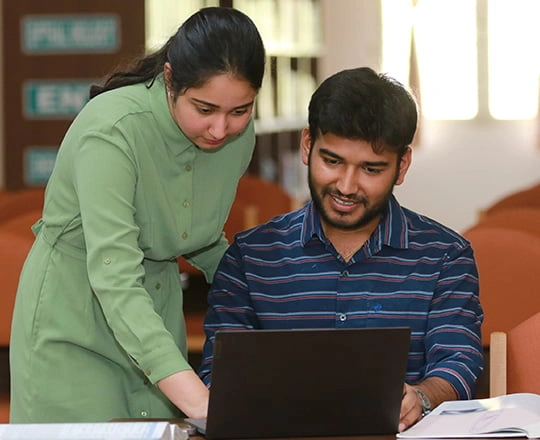COURSE OVERVIEW

The B.Tech. CSE (Cyber Security) programme at The Apollo University is an emerging area of Computer Science and Engineering (CSE). To address the industry’s increasing demand for skilled security professionals in the public and private sectors, the Department of Computer Science and Engineering has designed the B.Tech. programme in Computer Science and Engineering (cybersecurity) for the year 2023.
The cybersecurity curriculum provides students with hands-on practical experience with secure systems and applications, an understanding of the legal requirements associated with cybersecurity and the ability to lead, manage and contribute to building cybersecurity solutions. The comprehensive understanding of Secure coding, Information, Network and web security, Cryptography, Cyber risk, Security in context: legal, behavioural and ethical issues and Government and national security.
The department has well-qualified and experienced faculty members. The faculty is a perfect blend of different specialisations in Computer Science and Engineering to impart their expertise in handling diversified courses of the UG Programmes. The teaching methodology in the department goes beyond fulfilling the syllabus requirements of the University to meet today’s industry needs. The faculty motivates and guides the students to do mini-projects in core subjects. Special focus will be given to developing Communication and Soft Skills. The department has a strong association with industries to uplift the students’ practical knowledge.
Programme Objectives
- To develop a strong theoretical and practical background across the computer science discipline with an emphasis on problem-solving.
- To inculcate professional behaviour with strong ethical values, leadership qualities, innovative thinking and analytical abilities in the student.
- Develop professionals with sound knowledge of the theory and practice of computer science and engineering.
- Facilitate the development of academia-industry collaboration and societal outreach programmes.
- An ability to apply mathematical foundations, algorithmic principles and computer science theory in the modelling and design of computer-based systems in a way that demonstrates comprehension of the tradeoffs involved in design choices.
Industry Leader Speak
When it comes to choosing a career in the field of engineering, there are many options available. However, computer science engineering is often a popular choice amongst students because of its application in a wide range of fields. As the world continues to change at an instantaneous pace, it can be challenging to keep up with the latest trends. Nevertheless, understanding these latest technological trends is significant for businesses and individuals who want to stay in the vanguard. The dynamic field of the Information Technology industry is full of new technologies, tools, software frameworks and innovative ideas. At The Apollo University, students focus on the development of modern technologies as they occur symbiotically and inevitably affect one another.

Srinivas Middekurva
Senior Associate Consultant
Infosys
PROGRAMME HIGHLIGHTS
Following are the key features of the B.Tech. CSE- Cyber Security programme at The Apollo University:

Programme Curriculum
-
Semester - I +
-
3 Week Induction Programme Course Code Course Name Periods per week
Credits Hours per week L T P BTAT1701 Engineering Physics 3 1 0 4 4 BTAT1702 Engineering Mathematics 3 1 0 4 4 BTAT1801 Problem Solving and Programming with C 3 1 0 4 4 TAUT1101 University Core -I (Communicative English) 3 0 0 3 3 — University Elective I 3 0 0 3 3 BTAL1701 Engineering Physics Lab 0 0 3 1.5 3 BTAL1801 Problem Solving and Programming with C Lab 0 0 3 1.5 3 TOTAL 15 3 6 21 36
-
Semester - II +
-
Course Code Course Name Periods per week
Credits Hours per week L T P BTAT1703 Probability & Statistics 3 1 0 4 4 BTAT1802 Basic Electrical and Electronics Engineering 3 1 0 4 4 BTAT1301 Data Structures 3 1 0 4 4 BTAT1302 Python Programming 3 1 0 4 4 TAUT1102 University Core – II (Environmental Studies) 3 0 0 0 3 — University Elective II 3 0 0 3 3 BTAL1802 Basic Electrical and Electronics Engineering Lab 0 0 2 1 2 BTAL1301 Data Structures Lab 0 0 2 1 2 BTAL1302 Python Programming Lab 0 0 2 1 2 TOTAL 18 4 6 22 36
-
Semester - III +
-
Course Code Course Name Periods per week
Credits Hours per week L T P BTAT2701 Discrete Mathematics and Graph Theory 3 1 0 4 4 BTAT2301 Design and Analysis of Algorithms 3 1 0 4 4 BTAT2302 Object Oriented Programming through Java 3 0 0 3 3 BTAT2801 Digital Logic design 3 0 0 3 3 TAUT2101 University Core – III (Health and Wellness) 3 0 0 3 3 — University Elective -III 3 0 0 3 3 BTAT2303 Constitution of India 3 0 0 0 3 BTAL2301 Java Programming Lab 0 0 2 1 2 BTAL2801 Digital Logic Design lab 0 0 2 1 2 TOTAL 22 2 6 22 36
-
Semester - IV +
-
Course Code Course Name Periods per week
Credits Hours per week L T P BTAT2307 Computer Organization and Architecture 3 1 0 4 4 BTAT2901 Management for Engineers 3 0 0 3 3 BTAT2501 Foundations of Data Science 3 0 0 3 3 BTAT2304 Database Management Systems 3 1 0 4 4 BTAT2305 Operating Systems 3 1 0 4 4 BTAT2502 Artificial Intelligence 3 0 0 3 3 BTAT2306 Universal Human Values 3 0 0 0 3 BTAL2302 Database Management Systems Lab 0 0 2 1 2 BTAL2501 Exploratory Data Analytics with R lab 0 0 2 1 2 TOTAL 21 2 4 23 36
-
Semester - V +
-
Course Code Course Name Periods per week
Credits Hours per week L T P BTAT3501 Machine Learning 3 0 0 3 3 BTAT3301 Computer Networks 3 0 0 3 3 BTAT3302 Automata and Compiler Design 3 1 0 4 4 — Faculty Elective – I 3 0 0 3 3 — Programme Elective – I 3 0 0 3 3 BTAM3501 MOOC – I 0 0 0 3 3 BTAT3303 Entrepreneurship and Start-up Management 3 0 0 0 3 BTAL3501 Machine Learning Lab 0 0 2 1 2 BTAL3301 Computer Networks Lab 0 0 2 1 2 TOTAL 18 1 8 21 36
-
Semester - VI +
-
Course Code Course Name Periods per week
Credits Hours per week L T P BTAT3502 Natural Language Processing 3 0 0 3 3 BTAT3503 Data Warehousing and Mining 3 0 0 3 3 — Faculty Elective – II 3 0 0 3 3 — Programme Elective – II 3 0 0 3 3 — Programme Elective – III 3 0 0 3 3 BTAM3502 MOOC – II 0 0 0 3 3 BTAL3502 Natural Language Processing lab 0 0 2 1 2 BTAL3503 Data Warehousing and Mining lab 0 0 2 1 2 TOTAL 15 0 4 20 36
-
Semester - VII +
-
Course Code Course Name Periods per week
Credits Hours per week L T P BTAT4501 Big Data Analytics 3 0 0 3 3 BTAT4502 Neural Networks and Deep Learning 3 0 0 3 3 — Programme Elective – IV 3 0 0 3 3 — Programme Elective – V 3 0 0 3 3 BTAM4501 MOOC – III 0 0 0 3 3 BTAP4501 Mini Project 0 0 2 1 2 BTAL4501 Big data Analytics lab 0 0 2 1 2 BTAL4502 Neural Networks and Deep Learning lab 0 0 2 1 2 TOTAL 12 0 10 20 36
-
Semester - VIII +
-
Course Code Course Name Periods per week
Credits Hours per week L T P BTAP4502 Project Work 0 0 24 12 24 BTAI3501 Internship-I Evaluation# 0 0 0 2 0 BTAI4501 Internship – II Evaluation# 0 0 0 2 0 TOTAL 0 0 24 16 24
PROGRAMME FEE AND SCHOLARSHIPS
| One-Time Fee | Admission Fee | ₹ 7,000 |
| 1st Year | Tuition Fee + Annual Recurring Fee | ₹ 275,000 + ₹ 13,000 |
| 2nd Year | Tuition Fee + Annual Recurring Fee | ₹ 275,000 + ₹ 13,000 |
| 3rd Year | Tuition Fee + Annual Recurring Fee | ₹ 275,000 + ₹ 13,000 |
| 4th Year | Tuition Fee + Annual Recurring Fee | ₹ 275,000 + ₹ 13,000 |
| Total Programme Fee (4 Years) | ₹ 1,159,000 |
Scholarship is available for eligible students
Eligibility
Candidates must secure 50% in Physics, Chemistry and Mathematics of Intermediate or in the diploma course or must have appeared for Class 12 or equivalent examination with Physics, Chemistry and Mathematics as major subjects from any recognised board. Candidates who have completed or qualified for the final year of a diploma in engineering courses are also eligible. Candidates must not exceed the age of 24 years and the minimum age for applying is 17 years as of 31st December of the Calendar Year.
Lateral Entry
| Total Course Duration | You Will Join In | Seats Available | Education Qualification |
|---|---|---|---|
| 3 Years | 2nd Year | 6 | Students must have completed their three-year engineering diploma in ANY branch of Engineering and Technology from a recognized institute to apply for this program. They also must have secured at least 50% marks in their diploma program. |
EMPLOYABILITY AREAS
The CSE (Cyber Security) graduates can explore employment opportunities in various public and private sectors. They mostly acquire the following positions:

- Application Security Analyst
- Digital Forensics
- Network Security Engineer
- Penetration Testing
- Vulnerability Management
- Cloud Security Management
FAQs
-
Which course is best for Cyber Security after 12th?
+ -A B.Tech. in CSE (Cyber Security) is among the top choices after 12th, offering strong theoretical and hands-on training in secure systems, coding, cryptography and risk management.
-
Is B.Tech. Cyber Security good?
+ -Yes. B.Tech. in Cyber Security is a solid choice as it blends core computer science with advanced security practices, addressing high demand across industries for cybersecurity professionals.
-
B.Tech. Cyber Security or B.Sc. Cyber Security – which is better?
+ -B.Tech. in Cyber Security is generally better as it provides a more technical and practical approach, including engineering concepts, programming, and real-world projects. A B.Sc. in Cyber Security is more theoretical and less industry-focused. For strong career opportunities and hands-on experience, a B.Tech. in Cyber Security is the preferred choice.
-
Is Cyber Security a good career in India?
+ -Yes. Cybersecurity is rapidly growing in India, with opportunities in the public and private sectors. Increasing cyber threats have created high demand for skilled professionals.
-
What is the duration of the B.Tech. CSE (Cyber Security) programme?
+ -The programme spans 4 years (8 semesters). A lateral entry option is available for diploma holders, reducing the duration to 3 years.
-
What are the core subjects covered in the B.Tech. CSE (Cyber Security) programme?
+ -Core subjects include Secure Coding, Network and Web Security, Cryptography, Cyber Risk, Legal and Ethical Issues, Machine Learning and Big Data Analytics.
-
What career opportunities are available after completing the B.Tech. CSE (Cyber Security) programme?
+ -Graduates can become Application Security Analysts, Network Security Engineers, Digital Forensics Experts, Cloud Security Managers, or Penetration Testers in various sectors.
-
Does the programme offer practical learning experiences like internships or projects?
+ -Yes. The curriculum includes mini-projects, industry collaborations (e.g., with Microsoft India) and internships in the final semester for hands-on experience.
-
What are the eligibility criteria for admission to the B.Tech. CSE (Cyber Security) programme?
+ -Applicants must have passed 12th with Physics, Chemistry and Mathematics, securing at least 50%. Age must be between 17–24 years by December 31 of the admission year.
-
Does the B.Tech. CSE (Cyber Security) programme at The Apollo University offers placement assistance?
+ -Yes. The university has strong industry associations and offers placement assistance, soft skill training and exposure to projects with reputed organisations.


